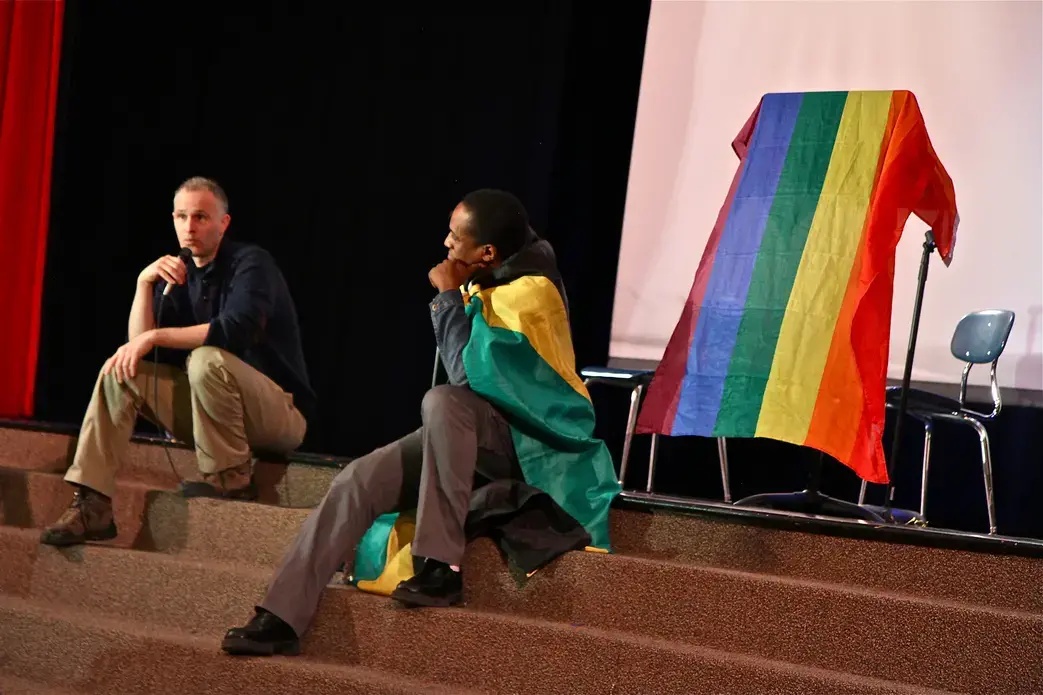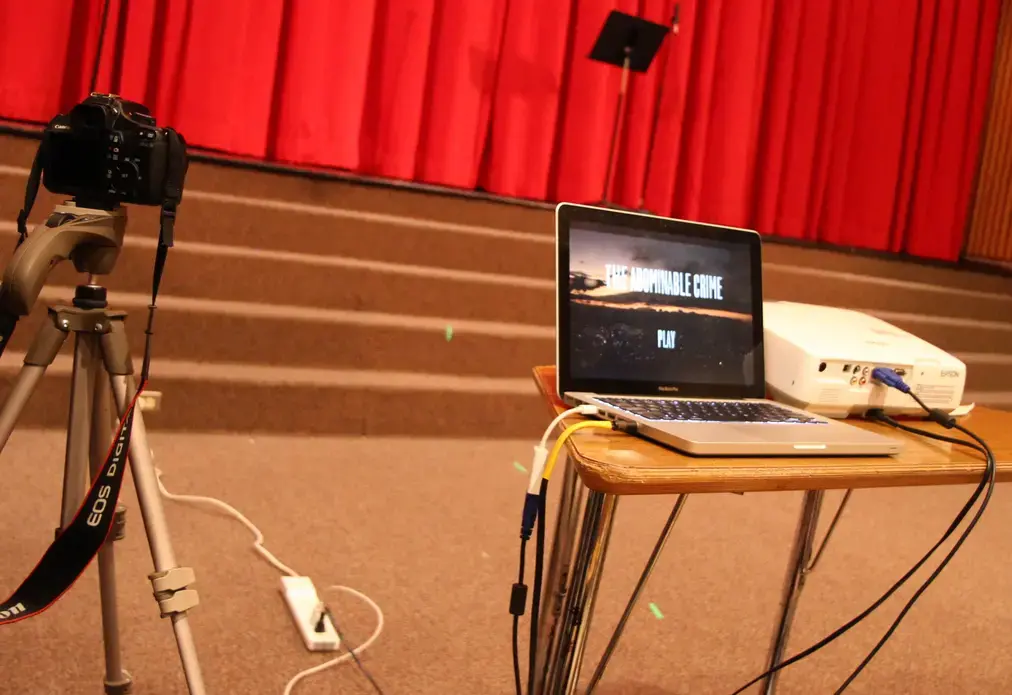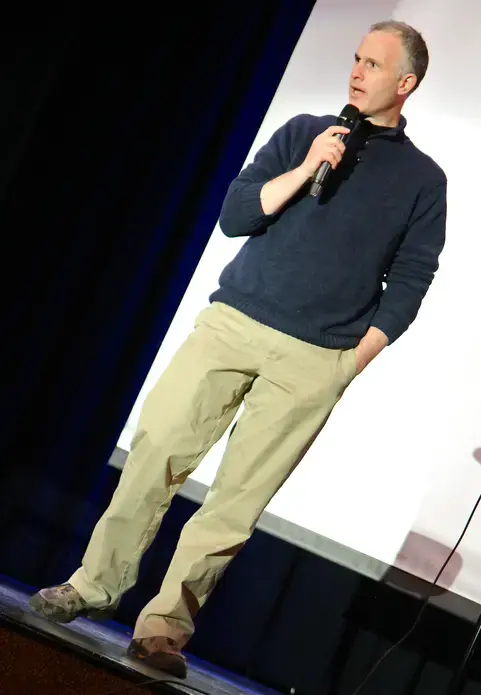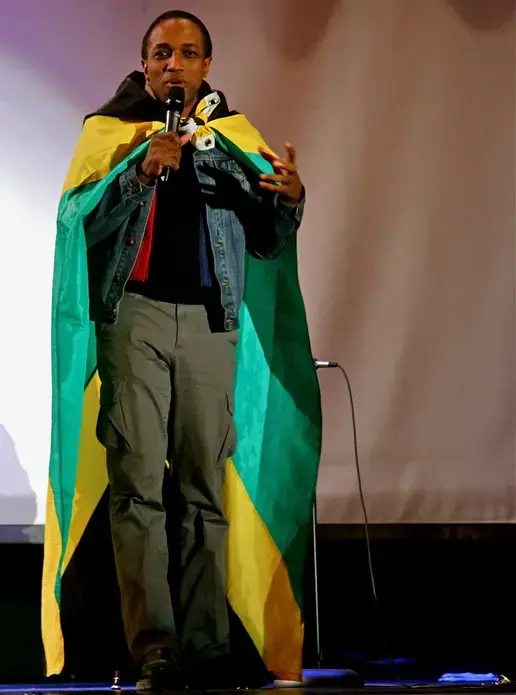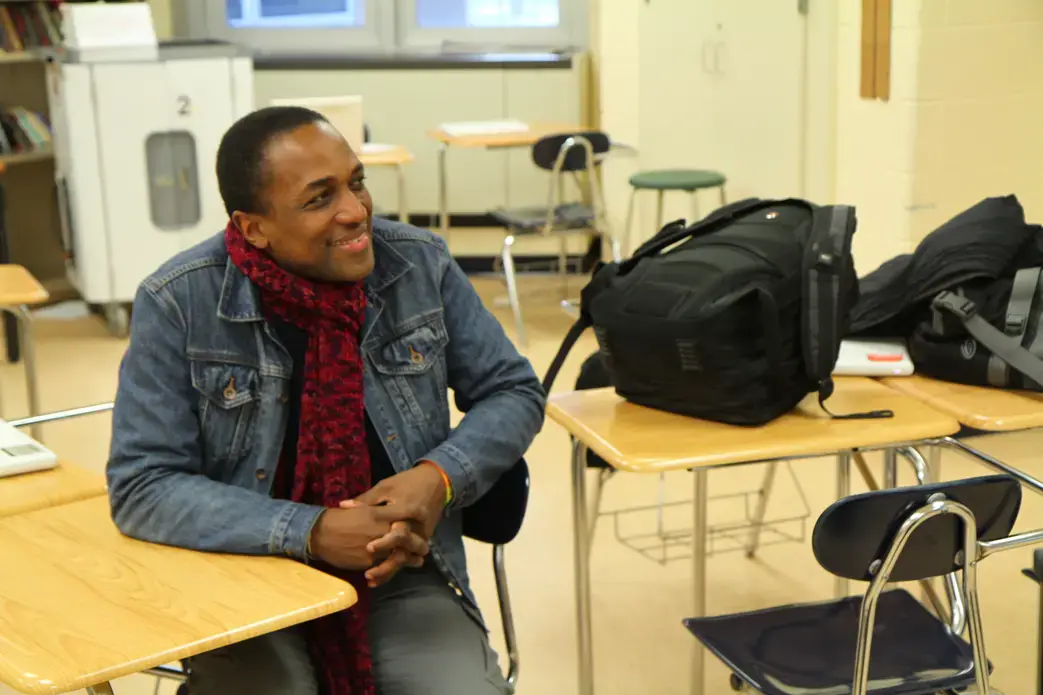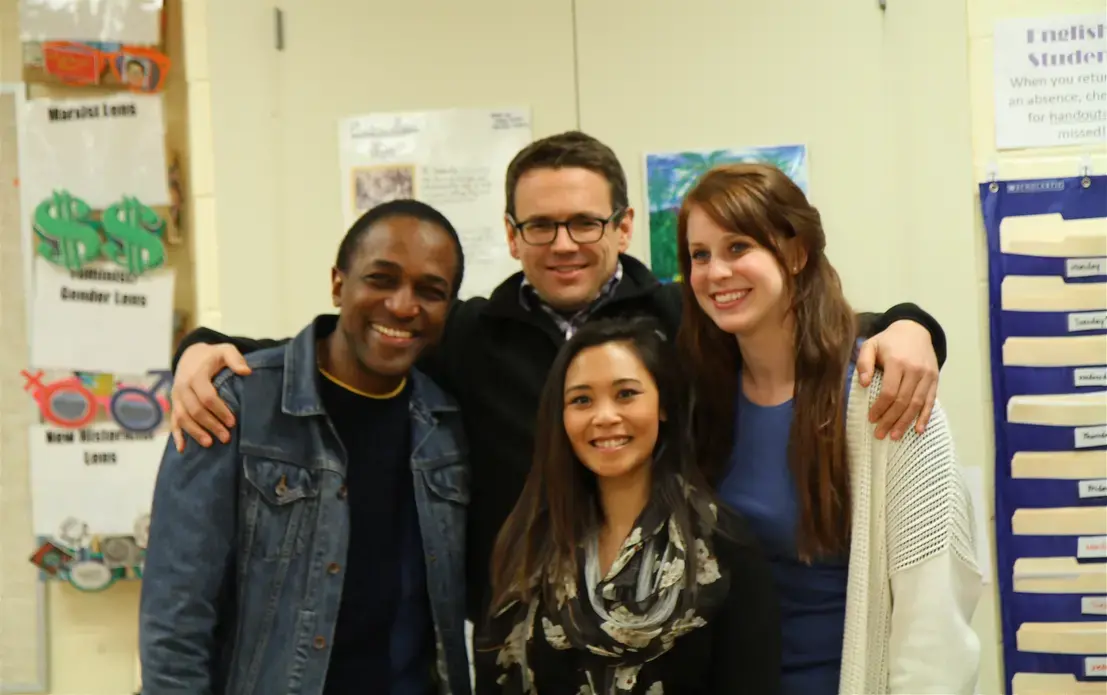On a Tuesday morning in late January Pulitzer Center education director Mark Schulte stepped out of the packed auditorium of The Arts Academy at Benjamin Rush in northeast Philadelphia for a quick break. A few moments later, he told Pulitzer Center staff back in our D.C. offices the next day, he heard an exuberant roar from inside.
Jamaican LGBT/HIV/AIDS activist Maurice Tomlinson stood up in the front row, turned around and waved to the 441 high-school students and teachers who'd started cheering when they found out he was in the room. The Abominable Crime, a feature-length documentary film by Pulitzer Center grantee Micah Fink, had just come to a close on the projector and students had spent the previous hour immersed in Tomlinson's journey as a gay Jamaican forced to flee his home country under an avalanche of death threats.
The film also follows the story of a lesbian single mother who left Jamaica for the Netherlands after suffering two gunshot wounds in a hate crime. It has appeared in more than 15 film festivals across the globe and been met with enthusiasm and thoughtful conversations at schools in Washington, D.C., Missouri, Illinois and now Pennsylvania.
"It's a film that seems to be finding its audience," Micah told students that afternoon.
But students and teachers at Benjamin Rush wanted to be more than just an audience.
The Arts Academy at Benjamin Rush: Day of Social Justice
Under the guidance of English teacher Lorraine Ustaris and media arts teacher and school co-founder Louis Mazza, Benjamin Rush students and faculty formed a committee to plan the school's first-ever Day of Social Justice around The Abominable Crime.
Lorraine explained that the idea started as "Equality Day," examining LGBT issues around the world as part of one student's senior project. Mark, who works closely with Benjamin Rush on our Global Gateway programming, had already been planning to do some education work with Micah around Crime in Philadelphia. That stroke of serendipity launched the planning process for a broader focus and students worked "tirelessly – even feverishly – as soon as they got back from holiday break," according to Lorraine, to organize the events.
Want to host your own Day of Social Justice, but aren't sure where to start? We can help! E-mail Mark and Amanda in the Pulitzer Center education department at [email protected].
Schedule
Period 1: In classrooms, students constructed a definition of "social justice" and considered how we achieve it, watched a student-produced video about social justice and a trailer for The Abominable Crime.
Period 2: Exploring social justice issues. Teachers used Pulitzer Center materials in the PowerPoint at the bottom of this post to introduce several global social justice issues and talk about the ways photography can bring untold stories to light.
Periods 3-4: Entire school watched The Abominable Crime, most in the auditorium with overflow in classrooms, followed by a student-moderated discussion.
Periods 5-6: Lunch/student creative performances in the auditorium. Students worked with autism support teacher and slam poet Devington Watkis to write and perform original songs and poems related to social justice issues they felt directly affected them.
Periods 7-8: Whole-school assembly and Q&A with Micah Fink and Maurice Tomlinson.
Reactions
We've screened Crime for hundreds of students and members of the public since its world premiere last June but this was one of the most animated receptions Mark and I have seen yet: the audience gasped, groaned, laughed, sighed and sniffled right on cue. It's a heavy film laced with hope, and students respond to that.
"You always know that stuff's happening in the world, but you choose to ignore it," junior Jessica said afterward. "Watching documentaries and stuff just makes me feel like I really want to do something about it. I can do my part and expose the situation."
"It's not converting [people], it's not like yelling at them or being violent," added Jessica's friend Sarah, also a junior. "It's educating people about what's going on."
Conversations in schools around Crime strike a particular chord of relevance with students today: homosexuality and gay rights are some of the most actively debated issues of their time and they often see the controversy differently than their parents do. Micah and Maurice frequently acknowledge the ongoing "revolution," as Micah calls it, for civil rights for homosexuals in the United States.
"This is a conversation that didn't exist 10, 15 years ago in public [in the U.S.]," Micah told Benjamin Rush students. "It has moved forward tremendously. What you guys represent is actually quite radical in some ways."
Student-moderated discussions
After the film ended Lorraine grabbed a microphone and informed the crowd that Maurice was actually sitting in the front row, which sparked the clamor Mark heard from outside.
To Maurice: "It's telling me [homosexuality] is okay…It's just an amazing thing, what you did and what you're doing. Live long."
To Maurice: "I'm so inspired. You shouldn't be scared to love someone the same gender as you. You showed everyone that it's love, like any type of love. It's the same love. So thank you for coming."
Question: What comes first: a change in laws of a country or a change in values and attitudes of its citizens?
One response: "The law is just a piece of paper, a saying. Values are the things that hold us together as human beings. We all need to accept everyone and love everyone right now before we let a piece of paper decide that."
"I just wanted to say live and let live. Do what makes you happy." [Audience laughs and groans.] "I mean, that's what it's all about."
During the whole-school assembly Maurice, who'd brought his Jamaican flag along, tied it over his shoulders to laughter and applause. He explained the symbolism of its colors: black, green and yellow.
"Hardships there are, but the land is green and the sun shines. So it's a very hopeful flag," Maurice said. "Even though we are experiencing some tremendous hardships in relation to our homophobia in Jamaica right now, we are a hopeful people. We do believe that we will overcome this."
He added that his activism work is often confused with "Jamaica-bashing."
"I just want Jamaica to live up to its national motto: 'Out of many, one people,'" Maurice continued. "And I do believe Jamaica will get there one day."
Student Performances
As part of preparation for the day, interested students and a few teachers made a list of social justice issues they wanted to explore through creative performances. We listened to powerful and passionate poems and songs about body image, sexual assault, gender identity, racial slurs, homosexuality and religion, modern-day slavery and self-acceptance.
"It's easy to say, well, that's someone else's issue. But at the end of the day they realize how much these issues – whether it's sex trafficking, drugs, alcohol, teenage pregnancy – somehow they have an impact on their lives," said Devington Watkis, the teacher and native of Jamaica who worked with the performers.
Micah spoke in a similar vein. "Creating work like this, whether it's journalistic work or poetic work or activism work, helps to move how people think about themselves and how they think about these issues," he told students.
A few moments from these performances that stuck with us:
Here are our stories, and here are our trials, and here goes our fight. Here are our journeys to take what's wrong and make them right. So step in and see what's really in me.
Who created these standards and how dare they make me feel uncomfortable in my own skin? How dare they allow others to judge me, to judge you, to judge anyone?
What can be defined as 'true?' We've invented everything. Nothing is true besides what we perceive as true…What is gender? An arbitrary concept?...Why does the gender binary exist?
Sometimes it's hard to follow your heart but tears don't mean you're losing, everybody's bruising, just be true to who you are.
So do something. Not just for you, not just for your family, but for humanity. Before there's nothing left of it.
What now?
"I'm sure there are some thesis papers that are probably going to be created based on what we did today," said Devington, chuckling.
"Before this documentary I had no idea what was going on outside of America. I was more upset that [gay couples] couldn't get married in Pennsylvania," exclaimed Rebecca, a junior. "And now I'm looking at that and I just want to help everything."
"If you combine media with social justice and the strive for equality you can influence people to do good and better their society and their community," said freshman Angelica.
Self-described "tech girl" Natalie, a tired but enthusiastic junior, told me: "I lit this and I provided sound for it, and I wish I could provide sound and light to the entire world to hear this day."
"We are the next generation. Educating us will allow us to make a change," said junior Sarah. "I think starting here at school is the greatest thing ever. You just start early."
"My grandparents talk about it all the time, that they were in the civil rights movement," Natalie said as we wrapped up. "But I'm in a movement as well. And when I have grandchildren I get to tell them someday, 'You know what? When I was 16 years old I was part of the gay rights movement.' And that's something that I cannot wait to say."
Micah encouraged the students to keep working for social justice. "You have a tremendous amount of power in a your hands as creative, bright young people," he told students.
Benjamin Rush students understand the seriousness and exciting potential of that power.
They're already planning next year.
Next on the docket for The Abominable Crime and the Pulitzer Center is a Europe tour March 18-31. Stay tuned to the Pulitzer Center website for more information.
- Document




